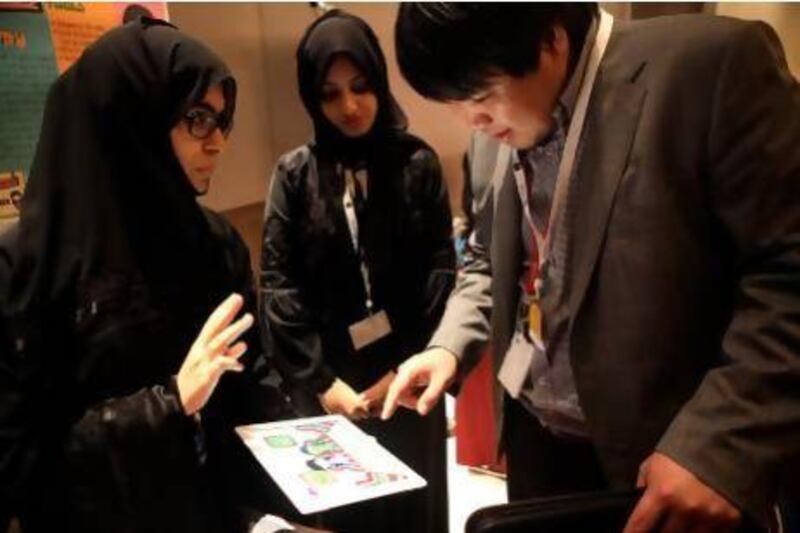ABU DHABI // Making Emirati cuisine has never been easier, thanks to a group of three students from UAE University who have put their grandmothers' recipes into a smartphone application.
Tabkh Time, ("cooking time"), won the women third place at the Mobile Application Contest in Abu Dhabi yesterday.
"We want to bring the concept to the younger generation because the girls of the new generation don't know how to cook," said Amna Al Dhaheri, a 22-year-old Emirati intelligence systems student. "They shift more towards contemporary food like Italian. We wanted to keep the UAE tradition alive."
So far, the app contains just four Emirati recipes, as well as a number of games, but the students hope eventually to expand the database.
"The app teaches you how to cook Emirati cuisine," said Kalthoom Al Awar, a 23-year-old intelligence systems student. "It's the first app that includes the Emirati dialect for cooking."
The dishes are kahwa, Arabic coffee, harriss, a type of Emirati porridge, khobz regag, a thin type of bread, and blalid, which are very thin sweet noodles often eaten for breakfast or as a snack.
"We got the recipes from our family members," said Nujood Al Sayari, a 25-year-old computer science student. "Some of us didn't even know the ingredients or the steps."
The group also plan on adding different languages. "We wanted something to at least document our recipes," said Ms Al Awar. "Food is part of UAE culture itself so we want it to reach westerners and the rest of the world."
Ahead of them in second place was the iVisit project from Khalifa University. The app allows users to visualise objects and tour exhibition centres and museums in three dimensions.
"It builds upon the idea of augmented reality," said Fatma Omar Mohamed, a 22-year-old Egyptian software engineering student. "It immerses the user in an enjoyable experience where he can visualise objects and this introduces a promising new technology."
The app provides a more efficient and faster way of booking museum or exhibition centre visits, whether in English or Arabic.
"Visitors can contact the venue and reserve the date preferred through the app," said Dina Atia, a 23-year-old from Egypt. "It also provides a map with driving directions, whether outdoor or indoor. You can do a self-tour using your device."
And this also helps save the environment. "We avoid wasting paper, because brochures can become available online," said Aamena Khalil Alhammadi, a 22-year-old Emirati.
"It also solves the problem of availability of staff to answer the phone, because you can book a meeting directly through the app."
The four winners were chosen by fives judges from 22 entries from 11 universities from the Middle East and North Africa, each of which gave a presentation about their app.
First prize went to Rania Hatem Hamouda, Mariam Ajili, Nur-A-Zarin Nishat and Amnah Al Nammi from Abu Dhabi University for their smart waiting room project.
Instead of paper tokens, the app gives users mobile tags, which update them on their progress up the queue.
Fourth place went to Abdulrahman Almousa, Albara Hakami, Omar Alessa, Mohammad Albarrak and Abdullah Altukhais from the King Fahd University of Petroleum and Minerals, in Dhahran, in eastern Saudi Arabia, for their project Sout Albahyan ("regional sound").
Working a little like the popular Shazam app, which identifies music, the app tells users which recitation of the Quran they are listening to. It compares input from the phone's microphone with a database, quickly determining which reciter and which verse they are listening to.
"Technology is moving fast," said Dr Jamal Zemerly, the steering and organisation committee chair. "And judges value more culturally-focused applications and anything that can be used in the region."






